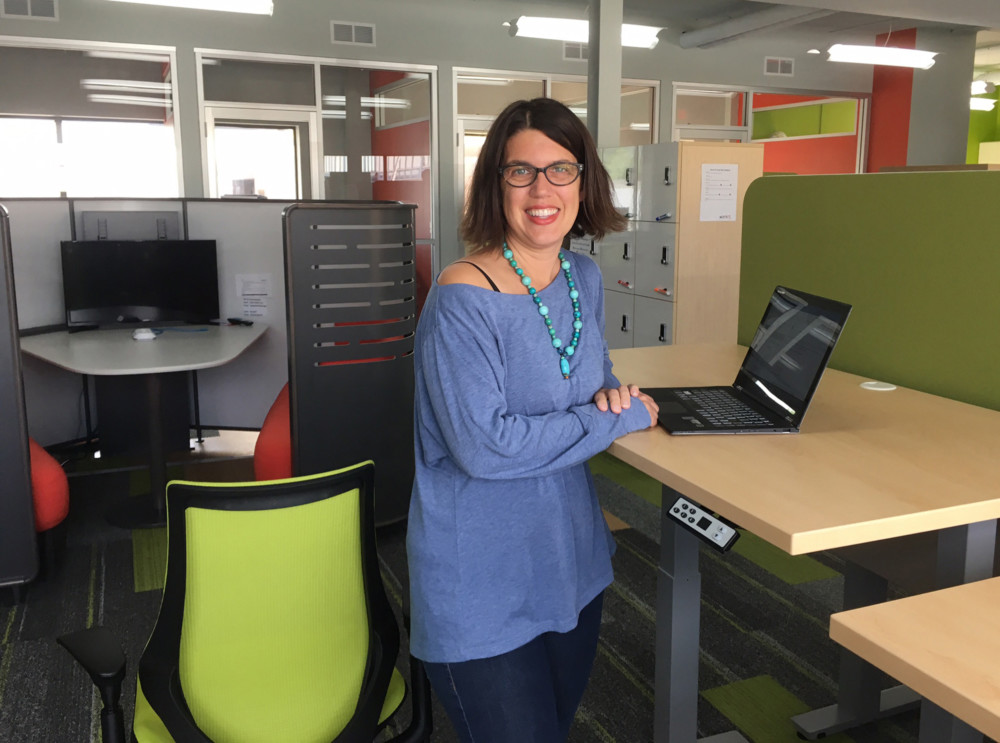By Christopher Snowbeck
Star Tribune (Minneapolis)
WWR Article Summary (tl;dr) The co-working trend is now in full swing in the Twin Cities, with hundreds of thousands of square feet of shared office space for freelancers and those who work far from corporate headquarters. Entrepreneur Anne Hendrickson noticed the trend and added an extra twist to her co-working location.
MINNEAPOLIS
When Anne Hendrickson was driving around the Twin Cities as a freelance consultant, she found herself wishing for a space where she could easily combine work with physical activity.
The ambition inspired Work It LLC, a new business Hendrickson opened last month in St. Paul.
It’s a co-working space that rents desks to freelancers, with the twist that clients can walk on treadmills or pedal a stationary bike while they work. There’s also a small on-site gym, showers and a kitchen complete with free olive oil for cooking.
Hendrickson hopes the action-oriented amenities will help the business stand out in the increasingly crowded co-working market.
“The fitness integration is brand, brand new,” Hendrickson said. “I think 10 years from now all offices will look like this.”
The co-working trend is now in full swing in the Twin Cities, with hundreds of thousands of square feet of shared office space for freelancers and those who work far from corporate headquarters.
COCO, which was the first collaborative office space business in the region, is expanding in Minneapolis, where national chains WeWork and Industrious are opening new offices. Several buildings in downtown Minneapolis and St. Paul are experimenting with short-term leases; the real estate company CBRE Group says more than 640,000 square feet of office space is occupied by shared workspaces.
Meanwhile, there’s continued interest among desk dwellers in becoming more active. The share of HR managers who say their employers provide or subsidize desks that let workers sit and stand during the day has grown to more than 40 percent, according to a recent survey.
The medical evidence to support standing at workstations has taken some hits in recent years. This month, researchers in Canada published a study suggesting that workers who stand on the job most of the time are at a greater risk of heart disease than workers who mostly sit.
The study in question wasn’t actually looking at the use of standing desks, but rather jobs like bank tellers and certain manufacturing positions where workers are on their feet at least five hours per day, said Peter Smith, a researcher with the Toronto-based Institute for Work & Health.
The health risk associated with prolonged sitting just during the workday is “pretty weak,” Smith said in an interview, but it can be a problem if it’s part of an overall sedentary lifestyle.
“A combination of sitting, standing and moving on the job is likely to have the greatest benefits for heart health,” Smith said in a news release about the study.
The sentiment is part of what’s driving Work It LLC, Hendrickson said. She thinks an active workspace can be part of the solution to a whole host of problems ranging from depression and anxiety to obesity.
Hendrickson recalls life in a cubicle more than 10 years ago, when she worked for a large company in downtown Minneapolis and walked the skyways just to recharge.
Work It charges $8 per hour, or $35 per day, for access to a desk. Memberships aren’t required, but clients can rent on a month-to-month basis starting at $300. They can also rent conference rooms.
The on-site gym includes dumbbells, a weight machine and kettle bells. Clients who work at one of the 15 low-speed treadmill desks or five cycling desks can work up a sweat on the gym’s running treadmill or elliptical machine.
“The amount we sit is so unhealthy,” Hendrickson said. “We can’t keep going the way we’re going.”
In 2005, Hendrickson opened Downtown Dogs, a doggy day care business on the edge of downtown Minneapolis.
She wasn’t looking to get out of the business but decided to accept when a good offer to sell came in 2015.
That’s when the consulting work started. Hendrickson said companies would hire her to help change their workplace culture to improve performance and morale.
As she drove from job to job, and camped in coffee shops in between, Hendrickson found herself thinking, “I could be working out now” or “I could be cooking.”
Hendrickson bought the building that houses Work It. Investment in the business has included not just desks and fitness equipment but also installation of an elevator and creating four bathrooms that provide access for people with disabilities.
Some aspects of the entrepreneurial life are “extremely scary,” Hendrickson said, but she likes the flexibility and the chance to have an impact.
“If you’re an entrepreneur, you definitely are pretty optimistic,” Hendrickson said.














































































































































































































































































































































































